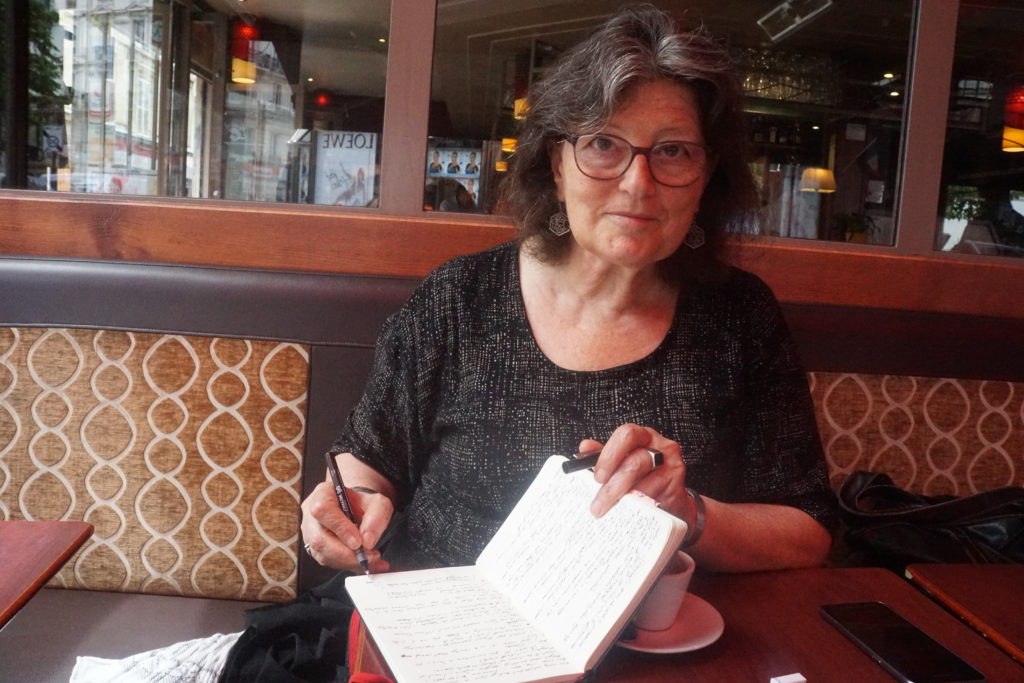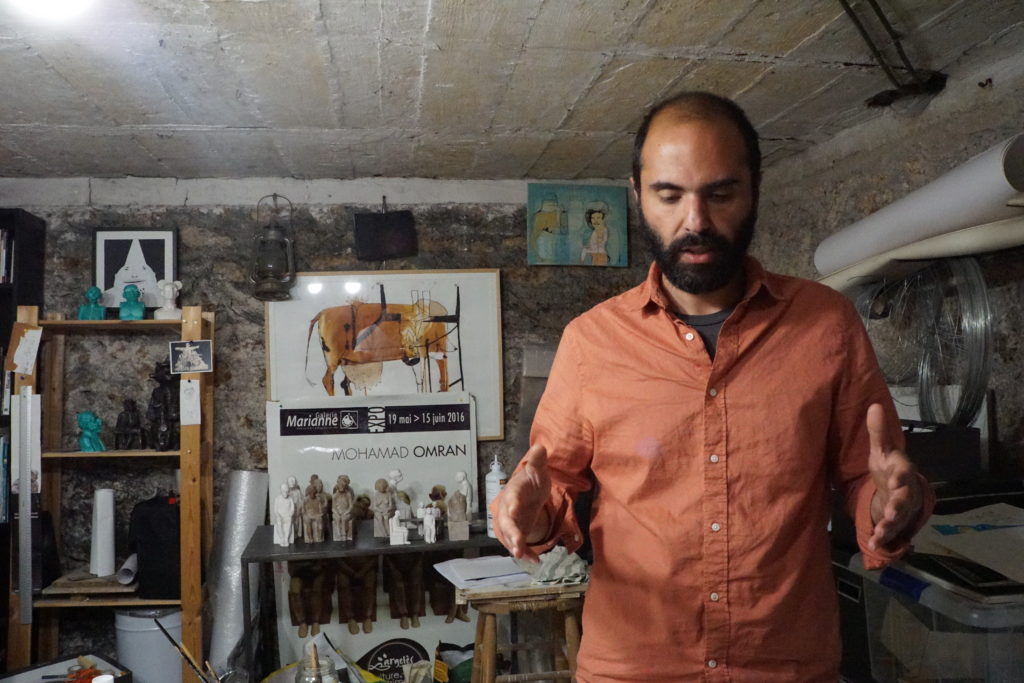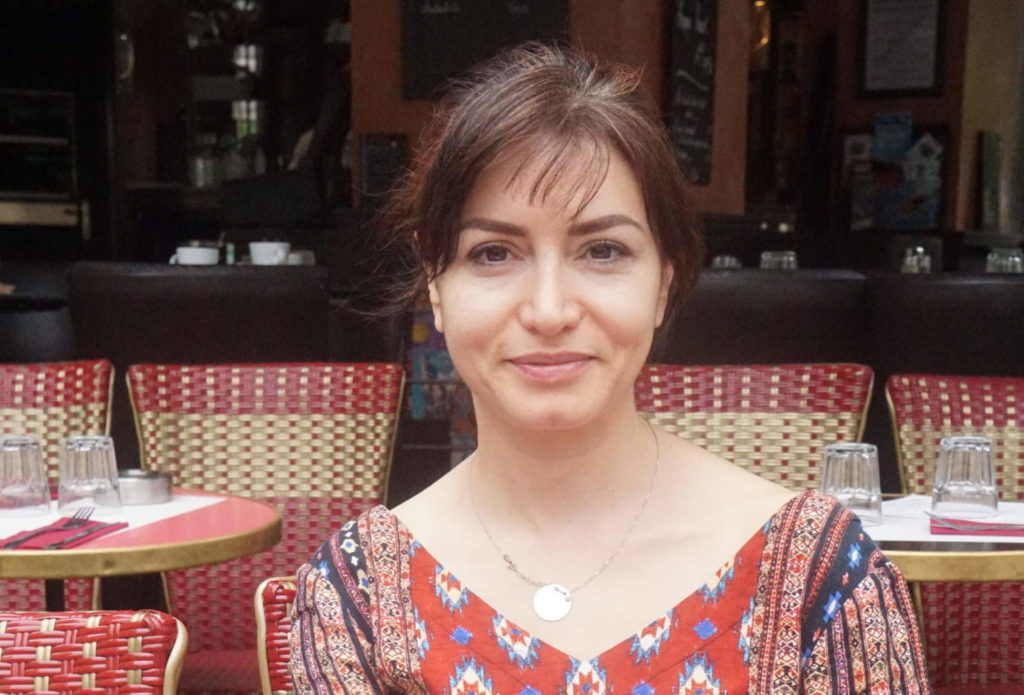(Paris, France) Immigration to a new country often elicits questions concerning identity. This is especially true in the case of artists, intellectuals and other individuals of high society whose public opinions are held to greater esteem.
In the Syrian context, as a result of the vast external displacement of artists, more and more questions are directed towards identity. What happens to your Syrian identity now that you are living in a new country? How is your identity affected by the new country’s respective integration policies? Implicit in each of these questions is the notion of identity as a monolithic concept linked to nationality. The reality is never so simple.
Prominent international writer and native Syrian celebrity Khaled Khalifa wrote a controversial phrase about identity as a static concept after his year-long writing fellowship at Harvard University. Upon meeting with Syrians around the world, he concluded that refugees “lose their identity but do not acquire a new one…to be a refugee is to live in a void -- a life that is painful however hard we try to embellish it.”
In the end, Khalifa preferred to return to Syria, no matter how difficult life is there, because living outside of Syria would have been too painful.
Yet his decision to return to Damascus left Syria Untold curious for more answers from the artists who do not have the privilege to return to Syria or purposefully choose not to. Many of them disagree with Khalifa’s understanding of identity, which is centered on the loss of identity while living abroad, the impossibility of gaining a new one, and the notion of return as the only way to restore the original identity.
Syria Untold spoke to a range of well-established Syrian artists living in Paris and posed them the very question about identity in the new land. While state attitudes towards handling immigrant populations vary largely, France makes for an apt case study on identity in the context of Khaled Khalifa’s definition. After all, the French concept of citizenship is traditionally based on assimilation, embracing French symbols and French culture, “not in widening the sense of what is French to include other cultures, races, religions, and values,” writes Gordon Adams, a professor of US Foreign Policy. On the surface, it would seem then that French policies make it more difficult for Syrians to retain their “original identity” if they aim to successfully integrate.
I Will Be Syrian Until My Country Is Liberated
Prominent filmmaker Hala Al-Abdallah is vehemently against Khalifa’s idea that those living outside Syria lose their Syrian identity, even in France. For her, identity turns and evolves without stop; it is never fixed nor boxed nor linked to nationality.
Becoming engaged in politics at a young age, Al-Abdallah recalls attending underground post-film debates following movie screenings in the Damascus Ciné-club (Nadi As-Sinama). As a result of her clandestine political activities against Hafez Al-Assad’s regime (1971-2000), she was sent to prison twice at the age of 20 before fleeing to Paris with her husband, the leading artist Youssef Abdelke.
For most of her life, Al-Abdallah has been fighting a revolution for Syria. She distinguishes between young activists and the French term, ‘militants’, that applied to her generation. “First, I think that there is a large difference between my generation and the generation that emerged in the wake of the revolution. During the 2011 revolution, there were young people profoundly engaged and ready to die on the streets but their engagement proved only as an improvising act. When some of these people make it to Europe, for example, their battle for Syria may, understandably, be over.”
Even after 35 years outside Syria, she continues to orient her future towards her home country. “I have the impression that I did nothing in France. I did all my films in Syria; I traveled at least 15-20 times to Syria with French citizens because I convinced them to go to Syria. When you enter my home, you have the impression it is in Syria because of the cuisine and decor. My daughter is linked to Syria as well. My heart, my eyes, my relationship and my spirit are with Syria,” she explained.
Despite all the hardship she endured in Syria, she feels connected to her “Syrian identity today because Syria needs me and France does not. In maybe ten years or whenever Syria becomes liberated and democratic, I will become a citizen of the world and my art will not need to take on a political role for Syria.” Al-Abdallah has played a pivotal role in the association Souria Houria that was founded to support the non-violent revolution and alert the French public six years ago. When the revolution broke out, she felt like a stranger in France because she did not see a unity with the Syrian people like there should have been.
At the same time, Al-Abdallah is well adapted in Paris and keeps an open spirit towards others. She further commented about the French state’s longstanding discrimination against Arabs. “Before the revolution, Syria was nothing at the time. When people used to note my accent and ask where I came from, I would respond, “I am Arab” to shake the stereotype. They would respond, “Oh it doesn’t look like it.” Now I say I am Syrian because I want to destabilize. You see here how identity changes and evolves with many facets and colors.”

Mohammad Omran is a renowned sculptor who left Syria for Paris in 2010, several weeks before the start of the revolution. During this time, he traded sculpture for a sort of unfiltered abstract drawing style that allowed him to express his subconscious reaction to the brutality on the ground. Omran understands Khalifa’s sentiments about identity and acknowledges that his own identity has changed a lot over the past decade. Yet above all he feels Syrian. “I am Syrian no matter what. It is my home country. My roots are Syrian. My family lives there,” Omran explained.
When the revolution erupted in 2011, Syria was omnipresent in all of Omran’s works and discussions. The face of the late ruler Hafez Al-Asad features in many of his drawings to dismantle his cult of personality. Little by little, though, the topic of Syria has become less direct. “After the birth of my daughter two years ago, I feel like everything I do today is for her and her future. So the subject of Syria has detracted a bit,” he acknowledged. “It is sad to say this and I think of course Syria is always in my head. But I don’t express it as directly as before. Maybe it is also because I want to avoid all that is violent; I can not stay imprisoned in this nostalgia. Because if I stay like this, I can not build a stable and credible life here.”
In 2014, Omran accepted his reality: never to forget Syria but to establish a new life in France. “The future of Syria is and will remain uncertain,” Omran recounted. “I do not have hope to return. In Syria, I only have my parents. All my intimate friends have left. My sisters and brothers have all escaped as well. I have no one else in Syria. Syria for me is friends and family. Of course, there are moments when I have nostalgia, like everyone, that is sure. But maybe I force myself not to think about Syria today like I did before,” he said to Syria Untold.
Today, he works on the theme of waiting. “We wait and we wait, but what are we waiting? Are we waiting for the end of the war? I do not know…”

Racha Rizk, the singer behind many of Arab World’s memorable cartoon theme songs, was 19 when she auditioned and received the gig at Spacetoon some twenty-years ago. She rose to stardom quickly amassing hundreds of thousands of fans across the region for songs that include ‘Captain Majed, Al Mo7aqeq Conan, Droob Remy, Babar, Ana wa Akhy, Anastasia, Cinderella, 3ahd Al Asdeqa2, Tweety, Pokemon, Al Dahekoon, Abtal Al Digital’ and countless more.
Rizk has always been a versatile performer. Outside Spacetoon, she specializes mainly in opera pieces, produces her own Arabic Jazz music, and taught singing at the High Institute of Music in Damascus.
Over the years, as generations of fans grew into adults, they watched Rizk publically react to her country’s revolution. Her message shifted; no longer did she weave her personal lyrics around censorship through allegory and metaphors, her criticism against dictatorial oppression became direct. She left Syria for Paris in 2012 as a student in the Ecole Normale de Musique. Her latest production is entitled ‘Malak’ (Arabic for ‘angel’), taking its name for a song in the album about children who perished at sea.
In the context of Khalifa’s conception of identity, Rizk responded: “I do not feel like I am searching for my identity nor do I feel like I have lost one. My identity, as well as my music identity, is coalesced into two worlds as I have always had both an Occidental-European and an Arabic-Oriental upbringing. But I feel identity is the wrong question to pose in the first place. […] I share with Amin Maalouf the opinion that identity is something that evolves every day. Identity is complex. Yes, I was born in Syria, in the Middle East, in Damascus from Druze parents and I speak Arabic. But I was raised in Catholic school, I learned French, I listened to Arabic music, to The Beatles, to Jazz Music, to Opera, and all the classical repertoire. This is my identity.”

Identity has turned into a commercial word used to make symposiums about Syrians living outside their country.
On the one hand, the idea of a distinct identity reinforces a false cultural incompatibility that recollects Samuel Huntington’s (1997) ‘Clash of Civilizations’ thesis, forcing an “us” vs. “them” narrative.
On the other, Khaled Khalifa’s innocuous understanding of identity evokes Michael Herzfeld’s “Cultural Intimacy.” Here, identity connotes an intimacy with Syrian daily life despite the hardships faced under totalitarian rule and exacerbated by upheaval and bloodshed. Identity is visceral, connected to everyday habits, senses, and customs of the homeland that cannot be replicated elsewhere -- no matter how hard one tries. It is understandable that Khalifa does not want to give these traditions up, but many Syrians are not afforded the privilege of returning for myriad reasons, among them: life threatening regime repression.
Each individual is complex and the only similarity that links Syrians together is that they once called Syria their home and now they might not. In general, many people find similarities between French and Syrian Mediterranean culture and are surprised to learn how well Syrians melt into their new countries. As Al-Abdallah, Omran and Rizk assert, identity is a dynamic concept. Their answers debunk the myth of a distinct “Syrian” identity that is in jeopardy with French society.
[Main photo: Artist Mohammad Omran in his studio in Paris - 11-6-2017 (AJ Naddaff/SyriaUntold)].



